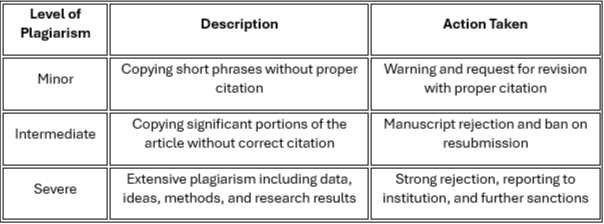| :: INFORMATION :: |
| For Readers |
| For Authors |
| For Librarians |
Editorial Miracle Get Journal acknowledges that plagiarism is unacceptable and therefore establishes the following policy which states specific actions (penalties) if plagiarism is identified in an article submitted for publication in the Miracle Get Journal.
Definition:

This policy can be adapted to fit your journal’s specific needs but covers the essential aspects of plagiarism screening commonly applied in public health journals. It helps maintain publication quality, credibility, and protects intellectual property rights.
| :: People :: |
| Editorial Team |
| Reviewers |
| Contact |
| :: Policies :: |
| Focus and Scope |
| Peer Review Process |
| Open Access Statement |
| Archive Policy |
| Posting Article Policy |
| Publication Ethics |
| Screening for Plagiarism |
| Manuscript Withdrawal |
| Correction and Retraction |
| Article Processing Charge |
| Indexing |
| :: Submission :: |
| Author Guidelines |
| Copyright and License |
| Privacy Statement |
| Manuscript Template |
Miracle Get Journal
Publisher CV. Get Press Indonesia
Phone : +62 853-6520-2765
Editorial Office of Miracle Get Journal | Jl. Palarik, Aie Pacah, Kec. Koto Tangah, Kota Padang, Sumatera Barat 25176
Email : miracle@gpijournal.com
This work is licensed under a Creative Commons Attribution 4.0 International license.
Design & Develop By : RYE EDUCATION HUB
![]()
